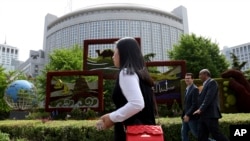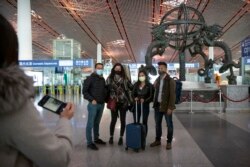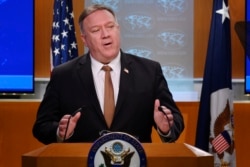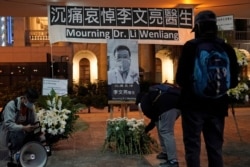On March 2, the United States announced a cap on the number of staff at five Chinese state-controlled media organizations in the U.S. In response, Beijing imposed measures on several U.S. media outlets in China.
The incidents marked an escalation in Washington and Beijing's media war, with journalists caught in the crossfire.
As a VOA China Branch correspondent, I had a feeling that once Beijing turned its attention to U.S. media outlets in China, VOA's Beijing bureau would be affected.
Sure enough, at midnight on March 18, the day after President Donald Trump referred to COVID-19 as the "Chinese virus" during a White House press conference, I received an email message from the Ministry of Foreign Affairs, giving the bureau 10 days to submit information on its staff, operations, finances and real estate.
The Foreign Ministry's International Press Center (IPC), which handles international media in China, faxed the same notice to the VOA Beijing branch, and called twice to confirm we had received it.
News later came that Time, The New York Times, The Wall Street Journal, and The Washington Post had received the same notice. American reporters at the latter three papers were given 10 days to return their press cards that allow them to work in China.
While those newspapers have journalists from other countries in their China bureaus, VOA Beijing and Time each have only one: an American.
So far, I have not been required to return my press card. The press card of the Time correspondent has not been revoked either.
Impact on Chinese journalists in China
Beijing's next move was to order Chinese press assistants to resign immediately from some U.S. outlets.
VOA's sole Chinese news assistant, Allen Lun Ai, received a notice from a diplomatic services company affiliated with the Ministry of Foreign Affairs asking him to resign.
It was not surprising that China targeted U.S. news outlets. But it was unexpected that it took action against more than a dozen Chinese working for U.S. media organizations.
Washington restricted the number of staff at state-run outlets in the U.S., all of whom are Chinese. Beijing's countermeasures deprived its own citizens of their right to work.
Chinese secretaries: A foreign journalist's right arm
When the foreign media report in China, the help of local news assistants is essential. These Chinese press assistants are known in the industry as "Chinese secretaries."
The name does not reflect their role. These "secretaries" generally have strong news capabilities, a deep understanding of society, and a relatively extensive social network. They are good at capturing public opinion and newsworthy information on social media.
In many ways, Chinese news assistants are much like a foreign reporter's right arm.
Beijing officially states that they cannot interview or report on their own, but many journalists from the U.S. and Europe rely on the ability of their Chinese assistants to communicate, express and understand Chinese. The information and news leads they provide help improve the depth and accuracy of foreign reporting.
They take photos of important news events and film those who speak out. When out in the field to cover politically sensitive issues, such as victims protesting allegations of child abuse at a kindergarten, or illegal fundraising, the presence of a Chinese secretary can help their foreign colleagues avoid potential harassment or other trouble.
Of course, when they are interrogated, detained, treated rudely or even beaten by Chinese authorities, these workers do not have the same protection that their colleagues' foreign passports provide.
It is no exaggeration to say that the job of a Chinese news assistant is a high-risk one.
In this U.S.-China media war, their departure has undoubtedly hindered the foreign media, and caught local hires by surprise. The coronavirus epidemic has severely disrupted the economy and it may be harder than normal for them to find suitable job opportunities.
China's foreign media circle suggested that because there were too few U.S. media reporters in China, the news assistants were fired to try to make up the numbers and match the 60 Chinese official media staff Washington expelled.
In response to Beijing's actions, U.S. Secretary of State Mike Pompeo recently said, "This is not apples to apples."
He pointed out the differences between independent media and party media, and the existence of press freedom in the U.S. and lack thereof in China.
'A healthy society shouldn't have only one voice'
Censorship is strictly enforced in China. It has become a norm that freedom of speech and so-called "negative news" are suppressed, while the official media report only good news.
Hospital leaders, local police and official media threatened those who spoke up about the coronavirus. They warned the public not to spread rumors about the outbreak in Wuhan, where it was first reported. The whistleblowers of the coronavirus crisis were silenced, with obvious consequences to all.
"A healthy society shouldn't have only one voice." Those words from Dr. Li Wenliang, uttered shortly before his death, still echo. Li was the whistleblowing Chinese doctor who issued warnings about the coronavirus and was reprimanded for doing so. He later tested positive for the virus and died.
After his death, Wuhan police withdrew Dr. Li's discipline statement and disciplined two low-level police officers who had been tasked with punishing him.
China, however, has not held to account their superiors, the superiors' superiors, and the people who gave the order and directed Chinese state broadcaster CCTV to broadcast that "eight people who spread false information about Wuhan pneumonia were handled in accordance with the law."
Some netizens commented that using the low-level police to vindicate one wrongdoing just created another.
Under the epidemic and the public's call for freedom of speech, some of China's more loosely controlled media have published in-depth investigative reports. One view expressed online has suggested China should lift the restrictions on U.S. news websites to allow audiences inside the firewall to read, listen, and watch freely.
When U.S. Senator Ben Sasse and Congressman Mike Gallagher wrote to Twitter CEO Jack Patrick Dorsey last month, calling for officials in countries that block Twitter to be banned from the platform, it led to backlash on some Chinese networks that accused the U.S. of trying to suppress voices.
Twitter did not accept their request.
Yet I have witnessed frequent bans on the Chinese platform WeChat. Some groups with hundreds of members have been blocked 30 to 40 times for allegedly violating speech restrictions.
On February 12, Hu Dehua, the vice president of the liberal magazine YanHuang Chunqiu, (translated as Through the Ages), told VOA that Dr. Li was "a person who deserves my respect." He added that China would have benefited from more than one voice at other times of crisis, such as the famine that followed Mao's economic plan known as the Great Leap Forward.
Instead, the fallout between China and the U.S. means there are fewer voices.
On March 28, The Wall Street Journal's American journalists left Beijing. When they said goodbye to their friends at Capital Airport, a voice, apparently from a security guard, could be heard saying, "You can't take pictures here!"
It may have been the last warning they heard in their role as foreign journalists in China.
















